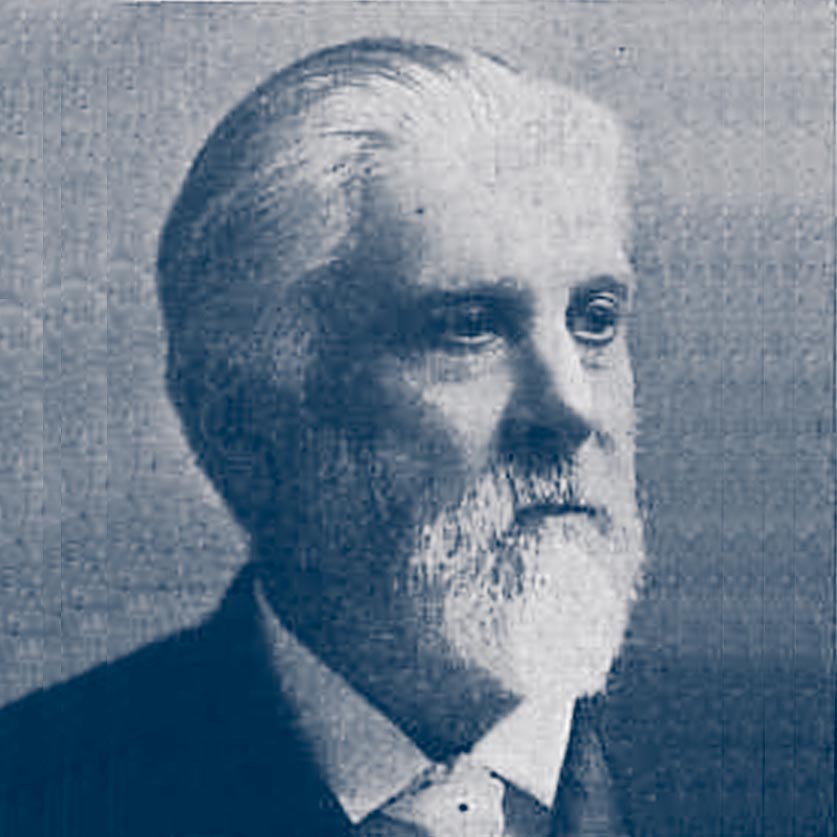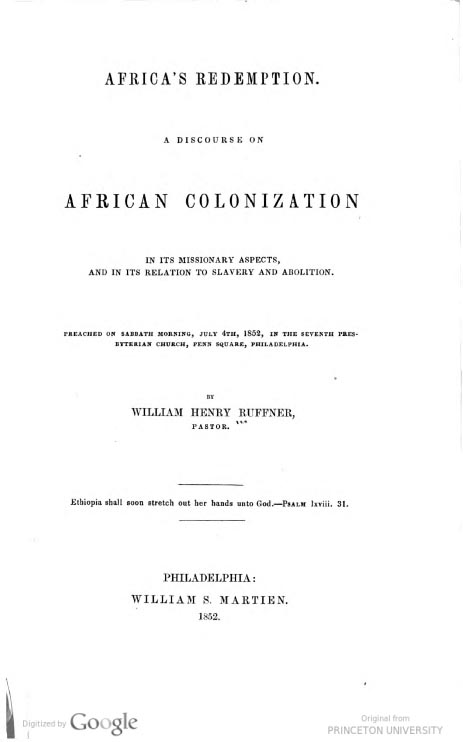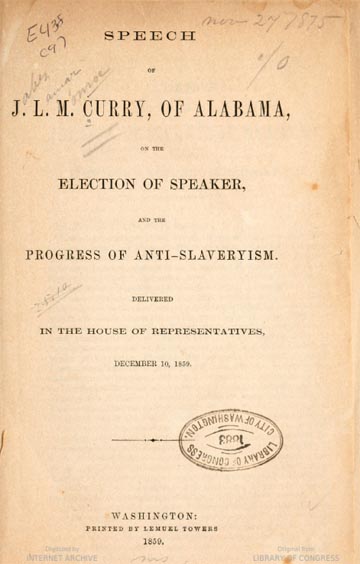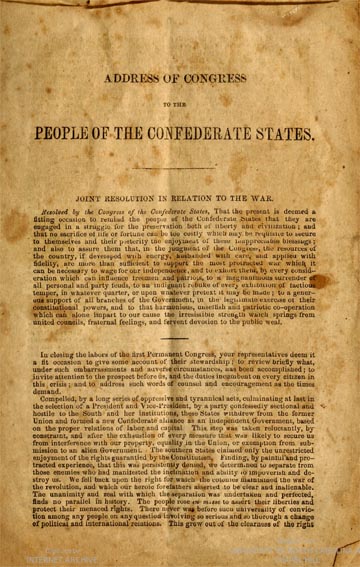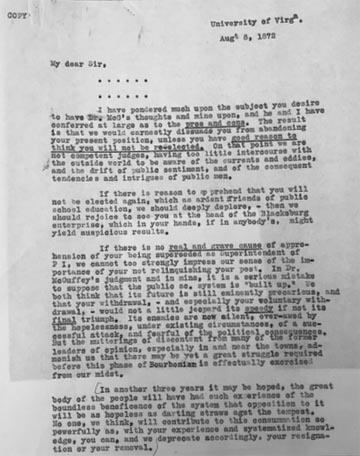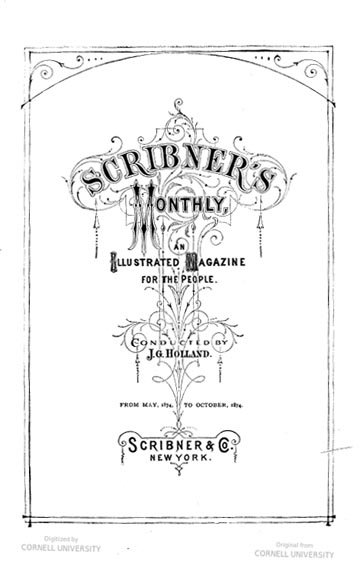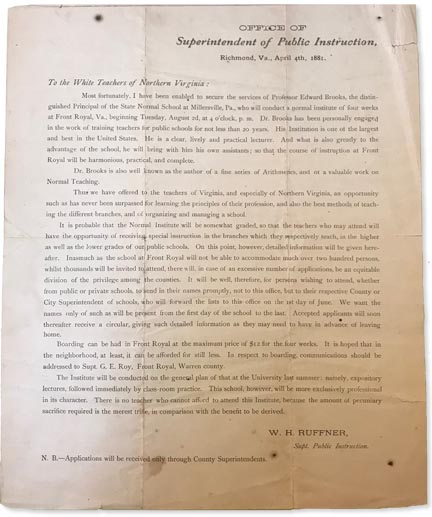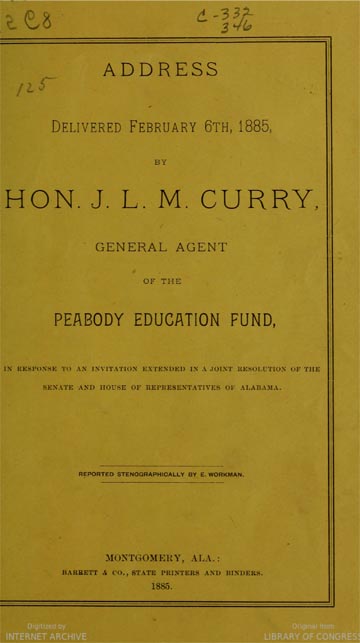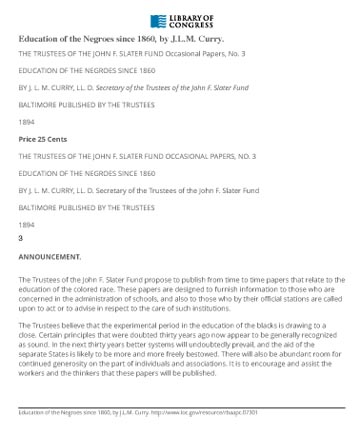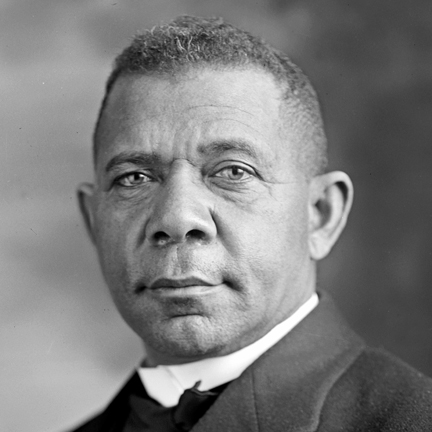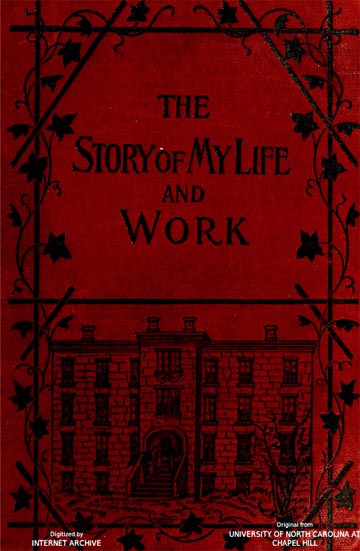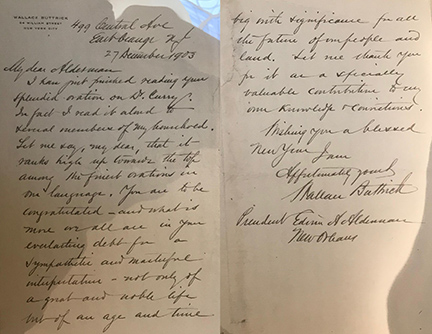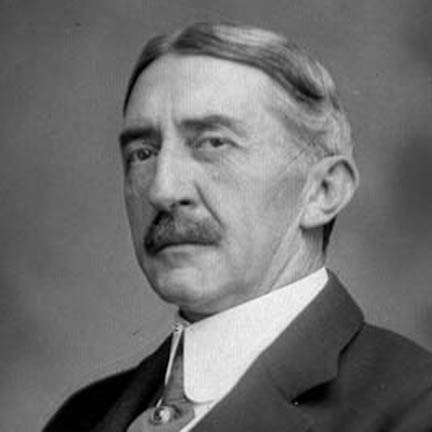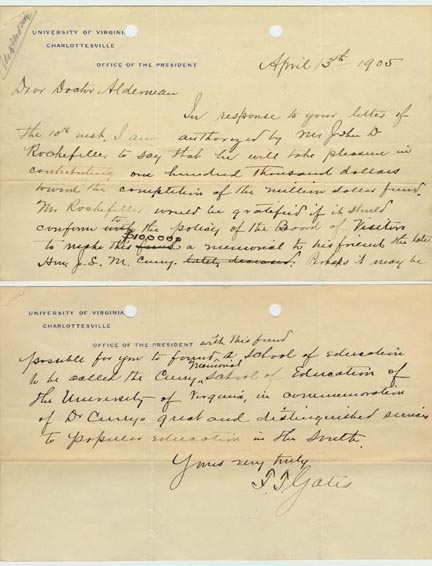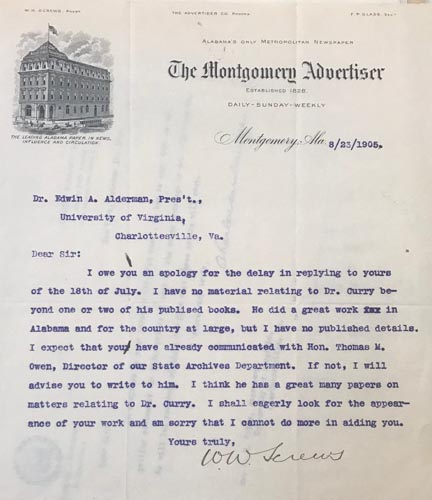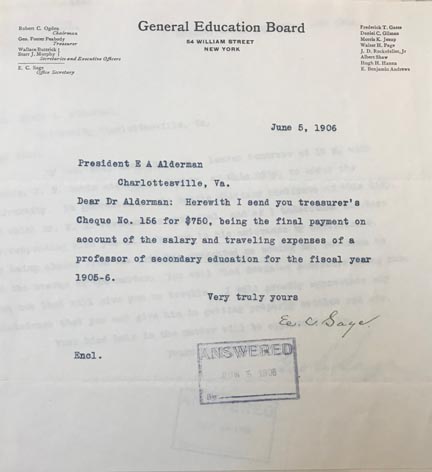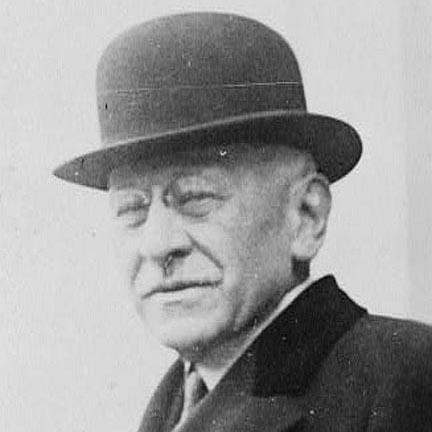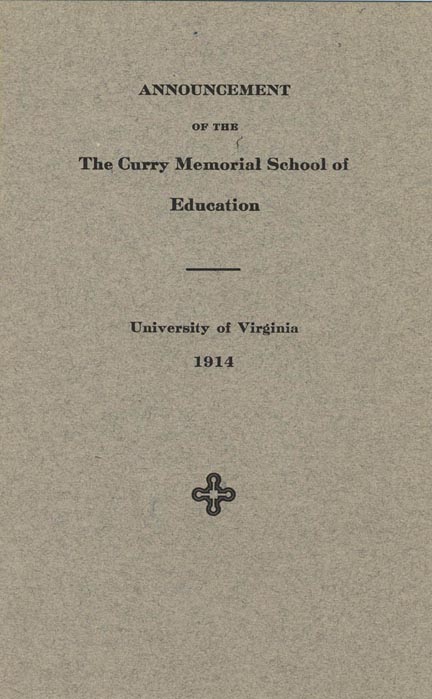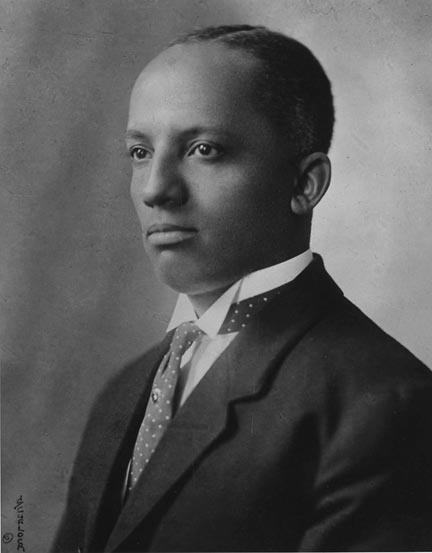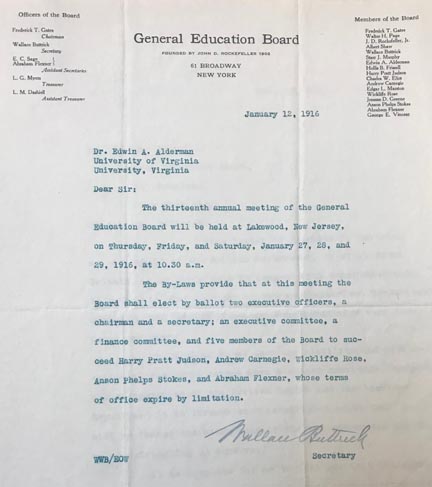Select complete timeline
Or, choose specific topics to right.
Thomas Jefferson originally proposes a public school system.
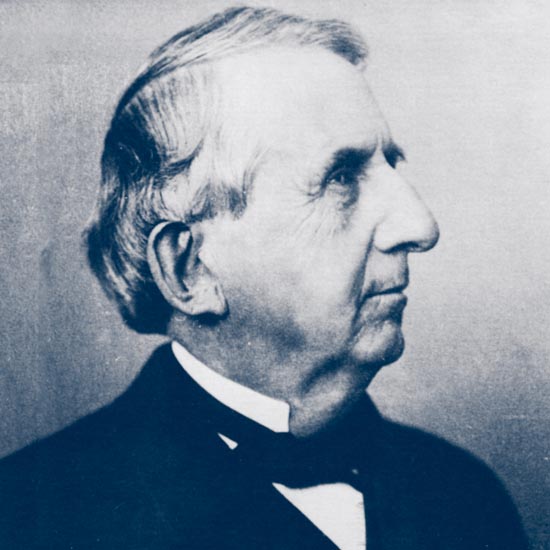
W.H. Ruffner born.
J.L.M. Curry born in Lincoln County, Georgia.
W.H. Ruffner graduates from Washington College.
J.L.M. Curry graduates from Franklin College, later the University of Georgia.
J.L.M. Curry graduates from the Law School at Harvard.
W.H. Ruffner receives an MA from Washington College, followed by seminary courses at Union Theological Seminary and Princeton.
J.L.M. Curry is admitted to the Talladega County Bar.
American Missionary Association is established; Protestant-based abolitionist group helps to start more than 500 schools and colleges for freedmen in the South, including:
- 1865 — Berea College & Atlanta University
- 1866 — Fisk University
- 1867 — Howard University, with the Freedmen’s Bureau
- 1868 — Hampton Institute & Tougaloo College
- 1881 — Tuskegee, specifically to train teacher
W.H. Ruffner joins the American Society for Colonizing the Free People of Color of the United States (American Colonization Society), which he serves for a few years.
J.L.M. Curry begins serving in the Alabama House of Representatives.
W.H. Ruffner renounces slavery.
W.H. Ruffner, Pastor at Seventh Presbyterian Church of Philadelphia.
W.H. Ruffner serves as a preacher and re-colonization advocate; in those same years he leases at least four enslaved African Americans and benefits from the labor of six others owned by his father-in-law.
J.L.M. Curry is elected to represent Alabama’s Seventh Congressional District in the U.S. House of Representatives.
Tax records report that through this season J.L.M. Curry owned a plantation of 550 acres, which was worked by 25 enslaved people and by 40 people in 1863.
Speech of J.L.M. Curry, of Alabama, on the election of speaker, and the progress of anti-slaveryism.
After Succession, J.L.M. Curry is elected to the First Confederate Congress and is the Speaker pro tempore of the Confederate House of Representatives in 1863.
J.L.M. Curry is a lead author and signatory of an Address of Congress to the people of the Confederate States.
U.S. Civil War ends, Lee surrenders.
Civil Rights Act of 1866 enacted.
Philena Carkin, a Massachusetts School teacher, comes to Charlottesville to teach, sponsored by the American Freedmen’s Aid Commission—leads to the establishment of the Jefferson School.
14th Amendment is ratified.
Act of Congress readmits Virginia into the Union post-Civil war.
Charlottesville has 4 Freedmen’s Schools: 1 elementary, 2 intermediate, and 1 normal.
Gov Gilbert C. Walker signs bill “An Act to Establish and Maintain a Uniform System of Public Free Schools”.
2900+ schools across Virginia, 130K+ students, 3000+ teachers.
W.H. Ruffner becomes first Superintendent of Public Education, Virginia, and is given thirty days to write the legislation outlining the public school system.
W.H. Ruffner is the leading agent of the building up of a public school system across Virginia.
38 public schools in Charlottesville and Albemarle County, with 19 listed as “Colored”.
W.H. Ruffner is re-elected to second term as Superintendent despite staunch opposition.
W.H. Ruffner publishes an essay in Scribner’s Monthly titled ”The Co-Education of White and Colored Races.“ The essay is a clear articulation of his views of racial difference in these years.
Civil Rights Act ends segregation in public places and bans employment discrimination on the basis of race, color, religion, sex or national origin; mandated mixed race schools.
W.H. Ruffner elected to Virginia Superintendent of Public Instruction.
By the 1880s, J.L.M. Curry spends his time advocating for public support for African American education, although motivated by white Southern interests and not with the presumption of racial equality.
First State summer normal schools.
W.H. Ruffner is able to implement segregated summer institutes for White and Black teachers.
W.H. Ruffner letter, “To White Teachers of Northern Virginia from W.H. Ruffner, Superintendent of Public Instruction”, is published.
J.L.M. Curry becomes an agent of the Peabody Education Fund, which sought to stimulate the expansion of common schools across the South.
W.H. Ruffner resigns from his position as Virginia Superintendent of Public Instruction.
First State normal institute.
W.H. Ruffner tries to get a position in the federal government as the next U.S. Commissioner of Education. President Cleveland appoints Nathaniel H. R. Dawson to the position.
J.L.M. Curry delivers address to the Peabody Education Fund in response to an invitation extended in a joint resolution of the Senate and House of representatives of Alabama.
Jim Crow laws legalize segregated schools, which also undermines school funding for blacks.
J.L.M. Curry moves his efforts entirely to the education of African Americans by joining the education committee of the John F. Slater Fund for the Education of Freedmen.
Walton Act passes (paper balloting v. voice only voting, with specific procedures for “honest and discreet persons” i.e. white males only).
In 1894, J.L.M. Curry delivers a keynote entitled “Education of the Negroes since 1860.” He is an advocate for separate and unequal universal education.
The Atlanta Cotton States and International Exposition, where Booker T. Washington delivers famous speech endorsing racial segregation -“five fingers and the hand” analogy for how the races can co-exist.
J.L.M. Curry serves on a committee that outlines the establishment of what becomes the Southern Education Board. He subsequently helps to establish the General Education Board with the support of John D. Rockefeller.
Southern Education Board established to promote public education reform.
Introduction by J.L.M. Curry to An Autobiography of Booker T. Washington.
Virginia Constitution contains literacy clause for voting; states that white & colored children cannot be taught in the same school.
General Education Board (GEB) incorporates to foster “the promotion of education within the United States of America, without distinction of race, sex, or creed.”
Letter to Dr. Alderman from Wallace Buttrick.
Edwin Alderman, 1861-1939, becomes first President of the University of Virginia; serves to 1931.
F. Gates’ letter to Alderman acknowledges the Rockfeller gift to establish the Curry Memorial School.
Curry Memorial School of Education established with $100,000 gift to UVA from John D. Rockefeller, Sr.
Letter to Dr. Alderman from The Montgomery Advertiser.
Letter to President Alderman from E.C. Sage, Professor of secondary Education, General Education Board.
Black voter registration is recorded on the rolls and reported in the Charlottesville Daily Progress.
Jeanes Foundation—known as the Negro Rural School Fund—is created by Anna T. Jeanes to benefit Negro elementary schools in the South. Fund officers work closely with the General Education Board to recruit & train a cadre of educators.
Julius Rosenwald is appointed to the board of directors of Tuskegee Institute, AL, and begins close long-term relationship with Booker T. Washington.
Carter G. Woodson founds the Association for the Study of Negro Life and History, later named African-American LH.
GEB Committee on Negro Education recommends increasing support for higher education in the Negro community, which helps to launch a funding campaign to support Negro colleges in the South. GEB dissolves in 1964.
Letter to Dr. Alderman from Wallace Buttrick, Secretary, General Education Board.
Rosenwald Fund established “for the well-being of mankind”. Wealthy philanthropist (part-owner of Sears, Roebuck & Co) contributed seed dollars and works with Booker T. Washington to establish rural schools throughout the South; JR Foundation headquarters moves from Tuskegee Institute to Nashville, TN.
Three accredited Negro high schools are in Virginia; none in Charlottesville.
86 Negro parents petition for a new Negro high school in Charlottesville.
The Jefferson High School is accredited by the Virginia State Department of Education for students from Grades 1 through 11. It is one of only 10 public high schools for Negroes in Virginia.
The Curry School moves from Peabody Hall into Ruffner Hall.
This timeline chronicles the lives of J.L.M. Curry & W.H. Ruffner. An historical timeline of the Curry School of Education & Human Development can be viewed on the school’s website.

